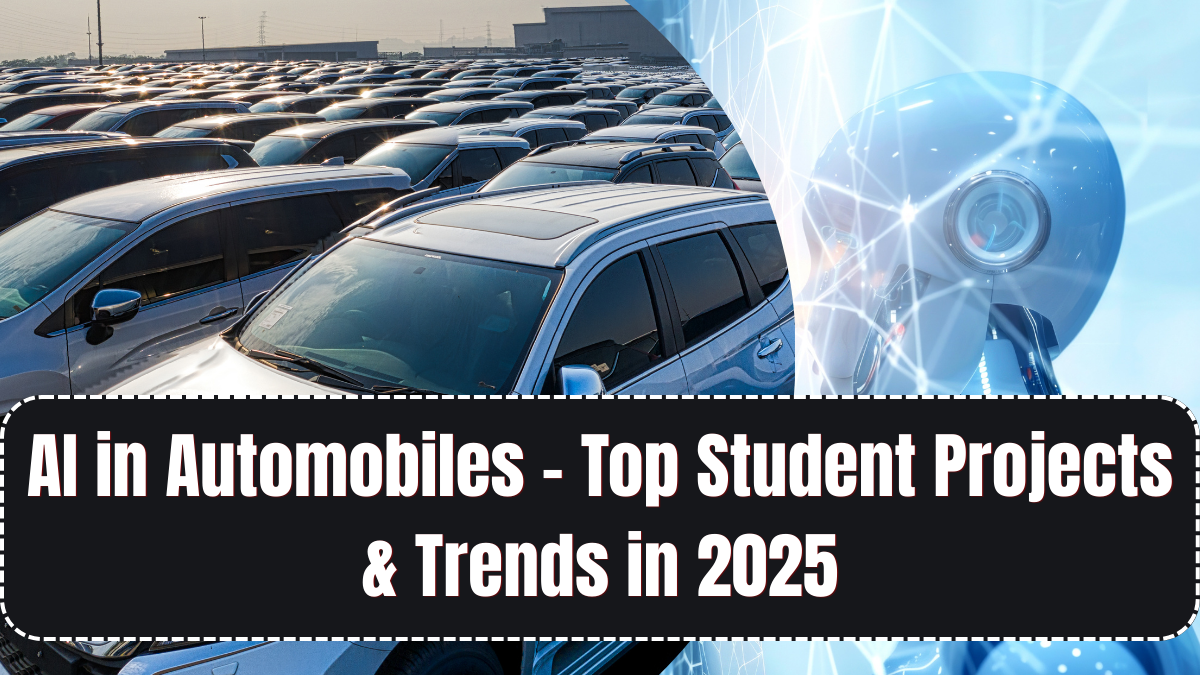The integration of AI in automotive industry is reshaping how vehicles are designed, driven, and maintained in 2025. From smart navigation to autonomous driving, artificial intelligence is now at the heart of innovation in the auto sector. Engineering students across India and globally are actively participating in this shift through real-world student projects, internships, and research in auto AI technologies.

Student Projects Driving Innovation in Auto AI
Colleges and technical universities are encouraging students to work on hands-on student projects that apply artificial intelligence to real-world automotive challenges. These projects range from basic sensor-based automation to full-fledged AI algorithms for driverless car systems.
Top AI-based automotive student projects in 2025 include:
-
Autonomous obstacle-avoiding car using computer vision
-
AI-powered accident detection and emergency alert system
-
Traffic sign recognition using neural networks
-
Lane departure warning systems with live video analysis
-
Voice-controlled in-car assistant using natural language processing
-
EV route planner using predictive AI and GPS data
These student projects are often showcased in national-level tech fests, internships, and company-sponsored competitions.
Engineering Internships in the Automotive AI Sector
In 2025, leading automotive and tech firms such as Tata Motors, Bosch, Mahindra Electric, Ola Electric, and Infosys are offering summer and semester-long internships for engineering students specializing in AI and automobile integration. These internships allow students to build prototypes, test real-time AI systems, and contribute to company research.
Highlights of AI internships in auto industry:
-
Machine learning for predictive maintenance
-
AI-based vehicle telematics and fleet monitoring
-
Integration of AI in advanced driver-assistance systems (ADAS)
-
EV performance optimization using artificial intelligence
-
Research on ethical AI decision-making in autonomous vehicles
These internships help bridge the gap between academic learning and industry applications, giving future engineering professionals the skills they need to lead in auto AI development.
Key Trends in AI and Automotive Engineering 2025
As the industry evolves, certain trends are dominating the application of AI in automotive industry. Student-led research is now focused on sustainable driving, traffic reduction, and personalized in-car experiences.
Major AI trends in 2025:
-
Predictive AI for vehicle maintenance alerts
-
Sensor fusion for improved autonomous driving
-
AI-based driver behavior monitoring for insurance profiling
-
Intelligent energy management in EVs
-
AI integration in connected and smart city traffic systems
All these developments show how artificial intelligence is not just about automation, but about smarter, safer, and more efficient mobility.
How Colleges Are Supporting AI in Auto Engineering
Indian and global universities have revamped their engineering syllabi to incorporate AI in automotive modules. In 2025, many institutes now offer AI-focused electives, lab training, and capstone project opportunities.
Common academic support includes:
-
Dedicated auto-AI labs with real-time simulators
-
AI and IoT modules within automobile engineering courses
-
Research grants for undergraduate innovation
-
Collaboration with auto startups for industrial projects
-
Use of tools like TensorFlow, OpenCV, and MATLAB in curriculum
This alignment ensures students graduating with expertise in AI in automotive industry are industry-ready from day one.
FAQs
What is AI in automotive engineering?
AI in automotive industry involves using artificial intelligence to power systems such as self-driving, smart safety features, traffic prediction, and in-vehicle user personalization.
Can students work on AI automotive projects in college?
Yes, many student projects now focus on AI integration in cars, including vision systems, ADAS, and voice control systems as part of practical coursework and competitions.
Are internships available in auto AI sector?
Absolutely. Companies like Tata, Bosch, and Ola offer AI-focused engineering internships where students work on real-world auto AI challenges.
What programming languages are used in auto AI projects?
Languages such as Python, C++, and frameworks like TensorFlow, OpenCV, and ROS are commonly used in auto AI projects and student research.
Is AI used in electric vehicles too?
Yes, AI plays a key role in EVs for battery management, energy optimization, and smart routing, making it a central part of the AI in automotive industry.
Click here to know more.




